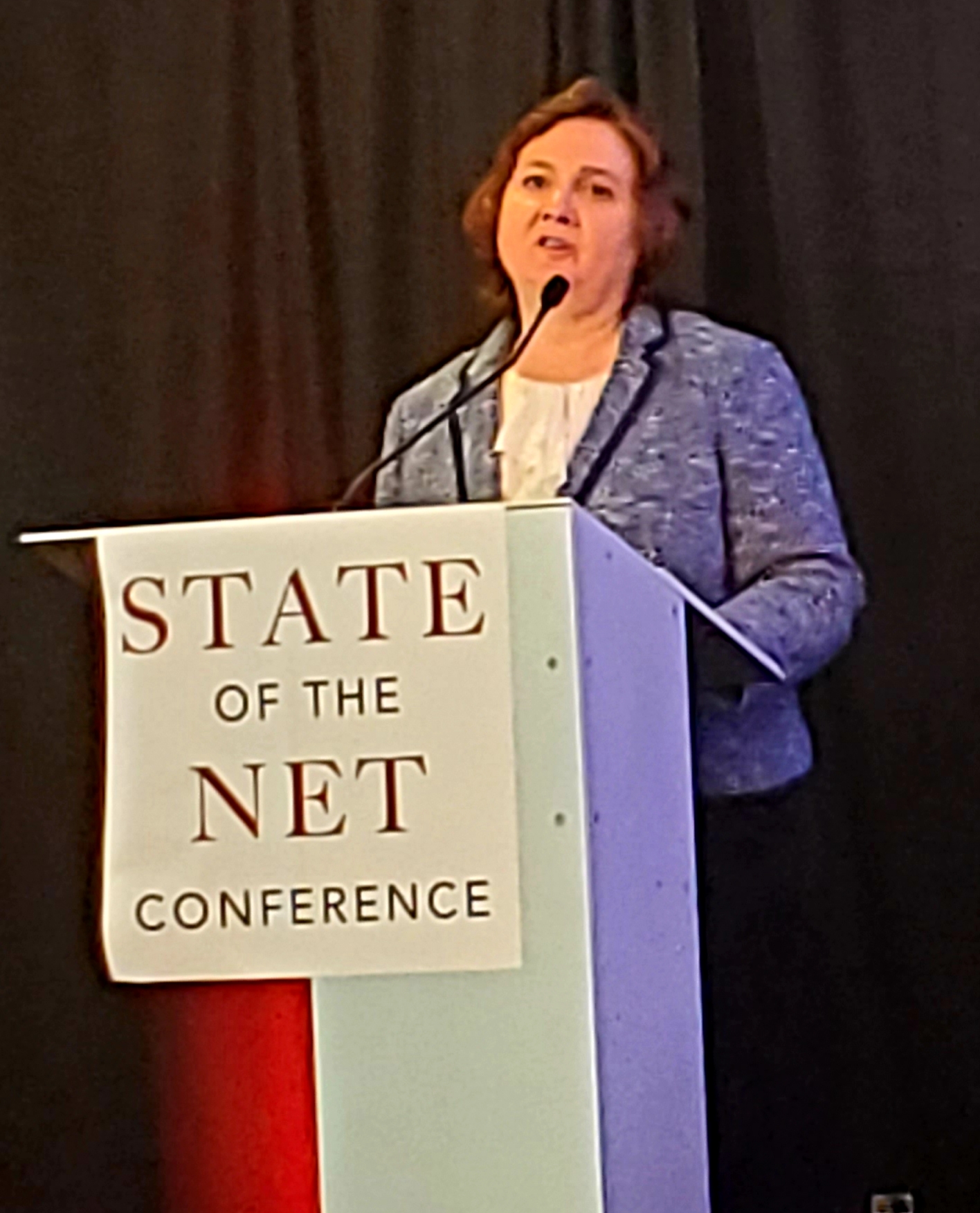Streaming Shakeout, Platform Outlook Examined at SOTN2020
The smarter way to stay on top of the multichannel video marketplace. Sign up below.
You are now subscribed
Your newsletter sign-up was successful
Although the need for a national privacy policy -- rather than evolving patchwork of state-by-state rules -- and the role of artificial intelligence permeated the dense discussions at the annual State of the Net conference, sessions on streaming media growth and the evolving role of media platforms put attention on current business issues that may have more immediate impact.
With its usual line-up of policymakers and its self-described position as "America's Premiere Internet Policy" event, SOTN2020 offered its usual array of telecom and media status reports during a day-long program in Washington on Tuesday, Jan. 28.
The "Video Streaming" session generated a forecast that after the inevitable shakeout of over-the-top providers, a new ecosystem will emerge that will be a reverse mirror image of today's structure, with ad-supported streaming services taking the role of today's "free" broadcasters and bundles of paid OTT channels replacing today's cable TV bundles.
Kannan Venkateshwar, a Barclays managing director focused on media/telecom research, predicted that "Netflix becomes the traditional broadcast network" because it carries a variety of program categories while other OTT services concentrate on specific audiences (such as Disney+ for families, NBC's Peacock for comedies).
Venkateshwar also examined the shifting global nature of streaming content. With such international expectations, "the scale of spending has gone up," he said. Although Netflix and other firms are creating specialized content in some countries or languages, most OTT content is intended for worldwide distribution. He said the only example of largely domestic content is sports (except for global soccer).
The SOTN discussion took place just as a consultant's analysis emerged, envisioning 50% global OTT revenue growth by 2024, surpassing $200 billion by then.
Another of the panelists, Daniel Ornstein, co-founder and CEO of Bundler Inc., said that a viewer's future collection of streaming channels is not like cable.
The smarter way to stay on top of the multichannel video marketplace. Sign up below.

"You can pick and delete something" at anytime," he said, underscoring the problems that process will create for broadband pricing, especially if carriers continue to package some OTT channels, such as the current Verizon and Disney+ combination. Ornstein, who heads the new California aggregator and marketplace for media subscriptions, was on the FCC chairman's staff about 10 years ago and later worked at Warner Bros. Entertainment and Warner Bros. TV. He predicted that "companies are going to overlap" and eventually the ecosystem will settle into a combination of new streaming structures.
"There will not be a total revolution of everything direct-to-consumer," he said, opining that "exclusivity is here to stay." He added: "Once you focus on content investment windows, carriage rights are a good way to generate revenue."
Larry Downes, an analyst, pointed to the different ways that Generations X, Y and Z (millennials) embrace streaming media, contending that the youngest cohort sees no difference between "professional" productions and self-produced content (such as small YouTube videos). He insists that these variations will require new business models, which will complicate the evolution of streaming channels.
DeShuna Spencer, founder and CEO of kweliTV, a black-focused streaming service, expects that the "streaming wars" will open opportunities for specialized content channels such as her service. While the major OTT companies are "fighting for the same content," ventures such as kweliTV can develop targeted audience. Spencer also pointed out that her company pays for programming as it runs, not up front as the major streamers do.
"Over time, maybe five years, spending will dry up," she predicted.
The Future of Platforms: Not Just Antitrust
With the evocative question of whether Tech Platforms will "Reign or Get Reined In?" the session on what will happen to the major platforms during the next 10 years generated a predictable range of responses. Most of the panelists agreed that in this volatile category, it's hard to predict whether Google, Amazon, Apple, Facebook or other currently dominant players will continue their juggernauts -- or how upstarts might plunge into these roles.
Their fates will proceed "completely irrespective of what [happens] with antitrust," said Ben Sperry, associate director-legal research at the International Center for Law and Economics. "If we move away from consumer welfare, you'll see a different kind of economy -- not necessarily good for consumers."
Steve DelBianco, president/CEO of NetChoice, warned that antitrust actions could affect innovation, since small companies often build strategies with expectations of being acquired by a major provider, such as the platform companies.
Privacy also plays a major role in the outlook for platform providers during the coming decade, the panelists agreed.
Katie McInnes, policy counsel at Consumer Reports, characterized "privacy as a luxury good." She and other panelists joined the chorus urging a national privacy policy to avert confusing state-by-state laws.
DelBianco also predicted that by 2030, "Government will still be trying to figure out how to regulate artificial intelligence," which will continue to be a major initiative of all the platform providers.
Privacy Focus, Including New Protections for Teens
Rep. Jan Schakowsky (D-Ill.), who chairs the House Subcommittee on Consumer Protection and Commerce, said she is preparing legislation that will restrict digital messages including some advertising to older children (presumably ages 13 to 17). The expansion of the Children’s Online Privacy Protection Act (which covers children 12 years and younger) is expected to be introduced later this week. (Update: Democratic Rep. Kathy Castor of Florida introduced the PRIVCY Act on Jan. 30.)
"We think it's important to put protections into the law to protect older kids," she said, citing it as part of "baseline privacy law." Although the proposed legislation will primarily be aimed at online social media, it may affect other media platforms. Schakowsky cited the need for such legislation because of the "propaganda of fake news" that will emerge during the upcoming election campaign.
“I feel a sense of urgency that we could have a complete fantasy of a message campaign in this election,” she said.
Rep. Cathy McMorris Rodgers (R-Wash.) emphasized the problems that are taking shape as many states -- notably the new California Consumer Privacy Act (CCPA) -- that have the potential to wreak havoc on national policy.
"It's easy to see a patchwork of laws that will be confusing to consumers and difficult for businesses," she said. Rodgers, the ranking member of the House Consumer Protection and Commerce Subcommittee, also pointed out that the parent Commerce Committee is still focusing on mapping of broadband in order to resolve lingering issues about the digital divide, which affects her semi-rural district.

Artificial intelligence was the sole theme of a final keynote by Dr. Lynn Parker, deputy U.S. Chief Technology Officer. She described the pending AI regulatory plan to "consider AI on a use-by-use perspective." She also addressed the emerging controversy about over-reliance on AI, insisting that it "is unethical not to use AI if it can be beneficial."
"Global leadership in AI matters," she said, but admitted that it is "not reasonable to believe every country will have the same approach to AI."
"We're still a ways away from defining" U.S. policy, Parker said.
Contributor Gary Arlen is known for his insights into the convergence of media, telecom, content and technology. Gary was founder/editor/publisher of Interactivity Report, TeleServices Report and other influential newsletters; he was the longtime “curmudgeon” columnist for Multichannel News as well as a regular contributor to AdMap, Washington Technology and Telecommunications Reports. He writes regularly about trends and media/marketing for the Consumer Technology Association's i3 magazine plus several blogs. Gary has taught media-focused courses on the adjunct faculties at George Mason University and American University and has guest-lectured at MIT, Harvard, UCLA, University of Southern California and Northwestern University and at countless media, marketing and technology industry events. As President of Arlen Communications LLC, he has provided analyses about the development of applications and services for entertainment, marketing and e-commerce.

